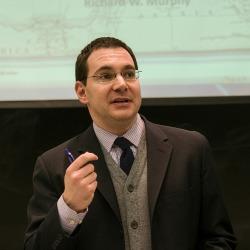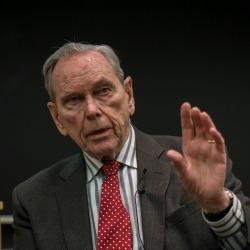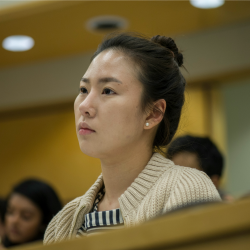Career Ambassador Discusses Unrest in the Middle East
Richard W. Murphy, Former Envoy to Syria and Saudi Arabia, Analyzes the Prospects for Peace in Conversation with Columbia Law School Professor Matthew C. Waxman
New York, April 18, 2014—Despite hopeful progress in Tunisia, the near-term prospects for peace and democratic reforms in Syria, Iran, and other hotspots across the Muslim world are not encouraging, said career ambassador Richard W. Murphy in an April 7th conversation with Professor Matthew C. Waxman at Columbia Law School.
Waxman, faculty co-chair of the Roger Hertog Program on Law and National Security, welcomed Murphy for what he called a “Charlie Rose-style conversation” before a group of students, faculty, and alumni.
“Richard W. Murphy is one of the most distinguished American career diplomats of modern times,” Waxman said. “He is a real legend at the State Department.”
| Hertog Faculty Co-Chair Matthew Waxman and Career Ambassador Richard Murphy discussed unrest in the Middle East. |
In a long and distinguished career in foreign service, Murphy served as an ambassador to nations including Syria, Saudi Arabia, and the Philippines. From 1983 to 1989, he was assistant secretary of state for near eastern and south Asian affairs and was particularly active in the Israeli-Arab peace process. He is one of just five people with the honorary title of career ambassador. After retiring from government service, he served as a senior fellow for the Middle East at the Council on Foreign Relations, and he remains a renowned authority on diplomatic issues.
“I don’t think we’re going to see a sudden turn to peacefulness,” Murphy said. “Revenge is forever part of politics in that part of the world, so the waters will remain roiled for some time to come.”
Murphy said Syria’s Assad regime thought it could use anti-Zionist and anti-western rhetoric to co-opt popular frustrations and avoid the recent wave of revolutions that spread across the Middle East in the so-called Arab Spring, but that the accessibility of technology and social media underscored many Syrians’ sense of marginalization and helped fuel a bloody civil war. Still, Assad has held on to power thanks to diplomatic and material support from Russia, China, and Iran, fears of chaos if the regime is deposed among the Syrian public, and a basic loyalty to the president even among the Sunni community that Washington underestimated from the beginning of the conflict.
“Russia and China have prevented the UN Security Council from unanimous resolutions, rendering it powerless,” he said. “The council can urge, it can counsel, it can complain in New York, but it is up against a government willing to use any means against its population. There is embarrassment for nations to be associated with a regime starving its people and using weaponry including barrel bombs and even chemical weapons against them, but it’s not yet a harsh enough international spotlight.”
| Students listen to the discussion on prospects for peace in Syria, Iran, and other hotspots in the Middle East. |
Murphy said he saw more potential for progress in ongoing negotiations with Iran about its nuclear program and continuing Israeli-Palestinian peace talks.
“The notes coming out of negotiations with Iran have been encouraging, so there could be a path forward,” he said. “We have invested so much as Americans into the peace process that we will probably see an agreement to talk beyond the deadline. Neither side wants to be blamed for the collapse of talks.”
Still, Murphy emphasized, hopeful signs do not necessarily herald the triumph of democracy.
“There isn’t a tradition of constitutional governance in the region,” he said. “There’s some progress in Tunisia but they aren’t a leader in the Arab world.”


